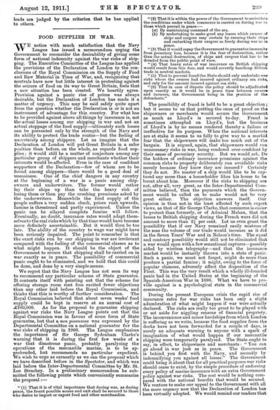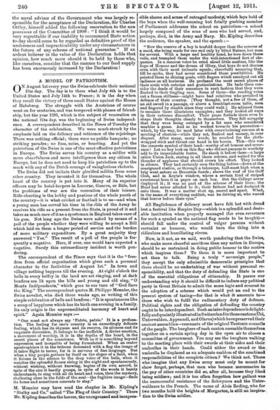FOOD SUPPLIES IN WAR.
WE notice with much satisfaction that the Navy League has issued a memorandum urging the Government to reconsider the desirability of giving some form of national indemnity against the war risks of ship- ping. The Executive Committee of the League has applied the provisions of the Declaration of London to the con- clusions of the Royal Commission on the Supply of Food and Raw Material in Time of War, and, recognizing that neutrals have now but little interest in protesting against the seizure of food on its way to Great Britain, feels that a new situation has been created. We heartily agree. Provision against a panic rise of prices was always desirable, but the Declaration of London has made it a matter of urgency. This may be said safely quite apart from the question whether the Declaration is or is not an instrument of advantage for this country. For what has to be provided against above all things by insurance is, not the actual losses among our shipping in war and not an actual stoppage of the food supply—ultimately such losses can be prevented only by the strength of the Navy and its ability to protect the trade routes—but the feeling of uncertainty among shippers. Let us imagine that the Declaration of London will put Great Britain in a safer position than before, on the whole, as regards food sup- plies ; it would still be a matter of conjecture among any particular group of shippers and merchants whether their interests would be affected. Even in the case of confident supporters of the Declaration—few of whom are to be found among shippers—there would be a good deal of uneasiness. One of the chief dangers in any country at the beginning of a war is a panic among ship- owners and underwriters. The former would rather lay their ships up than take the heavy risk of losing them or then pay the crushing premiums asked by the underwriters. Meanwhile the food supply of the people suffers a very sudden check, prices rush upwards, famine is threatened and partly experienced. Unless the panic can be allayed complete famine will follow. Eventually, no doubt, insurance rates would adapt them- selves to the real risks which by that time would have become more definitely ascertainable. But it would then be too late. The ability of the country to wage war might have been seriously impaired. The point to remember is that the exact risks run by our shipping in war are irrelevant compared with the feeling of the commercial classes as to what might happen. It should be the object of the Government to secure that shipping shall be carried on in war exactly as in peace. The possibility of commercial panic ought to be eliminated, and we hold that this could be done, and done by a very simple means.
We regret that the Navy League has not seen its way to recommend any particular scheme of State guarantee. It contents itself with pointing out that the scheme for offering storage room rent free excited fewer objections than any other laid before the Royal Commission, and thinks that this is worthy of further consideration. The Royal Commission believed that about seven weeks' food supply could be kept in reserve at an annual cost of £100,000. As for the proposal to guarantee shipping against war risks the Navy League points out that the Royal Commission was in favour of some form of State guarantee, but that a non possunius was expressed by the Departmental Committee on a national guarantee for the war risks of shipping in 1908. The League emphasizes the importance of Sir George Sy denham Clarke's warning that it is during the first few weeks of a war that disastrous panic, probably paralyzing the operations of the mercantile marine, is to be ap- prehended, but recommends no particular expedient. We wish to urge as earnestly as we can the proposal which we have described before in the Spectator, and which was laid before the Inter-Departmental Committee by Mr. St. Loe Strachey. In a preliminary memorandum he sub- mitted the following points which conveniently summarize the proposal :— " (1) That it is of vital importance that during war, as during peace, the freest possible access and exit shall be secured to those who desire to import or export food and other merchandise.
" (2) That it is within the power of the Government to assimilate the conditions under which commerce is carried on during war to those which prevail in peace :— (a) By maintaining command of the sea.
(b) By undertaking to make good any losses which owners of ships and cargoes may sustain by running their ships and embarking their cargoes as freely during war as in peace.
" (3) That it would repay the Government to guarantee immunity from pecuniary loss, because it is the fear of destruction, rather than the actual destruction, of ships and cargoes that has to be dreaded from the public point of view. " (4) That heavy rates of war insurance on British shipping would result from this fear, and would severely handicap British trade in neutral markets.
" (5) That to prevent fraud the State should only undertake war risks where the owners had insured against ordinary sea risks, and only for the amount insured against sea risks.
" (8) That in case of dispute the policy should be adjudicated upon exactly as it would be in peace time between owners and insurers, the Government being in the position of the defendants."
The possibility of fraud is held to be a great objection ; but it seems to us that putting the onus of proof on the shipowners or merchants would secure the Government as much as Lloyd's is secured to-day. Fraud is sometimes attempted on Lloyd's, but the business of Lloyd's is by no means rendered thereby a failure or ineffective for its purpose. When the national interests are at stake it seems to us folly to give way to a morbid fear that the shipowners will make too much out of the bargain. It is argued, again, that shipowners would run unnecessary risks in war, being rendered over-confident by their sense of pecuniary security. But we would ask, Do the holders of ordinary insurance premiums against the common risks to property deliberately run avoidable risks merely because they know they are insured ? Certainly they do not. No master of a ship would like to be cap- tured any more than a householder likes his house to be burnt about him. Moreover if the risks to shipping are not, after all, very great, as the Inter-Departmental Com- mittee believed, then the payments which the Govern- ment would be called on to make would not be very great either. The objection answers itself. Our opinion is thus not in the least affected by such expert views, as that of Sir George Clarke, that commerce is easier to protect than formerly, or of Admiral Mahan, that the losses to British shipping during the French wars did not amount to more than 2i per cent. Let us even grant the possibility that if our Navy remained easily mistress of the seas the volume of our trade would increase as it did in the Seven Years' War and in Nelson's time. The equal and contrary possibility would still not be eliminated that a war would open with a few sensational captures—possibly aided by wireless telegraphy—and that the insurance market would be instantly thrown into a state of panic. Such a panic, we must not forget, might do more than produce a partial famine ; it might, owing to the force of popular clamour, adversely affect the disposition of the Fleet. This was the very result which a wholly ill-founded panic had in the United States at the beginning of the Spanish-American War in 1898. What we have to pro- vide against is a psychological state in the commercial community.
During the present European crisis the rapid rise of insurance rates for war risks has been only a slight adumbration of what might happen if war were actually declared. The risks are really too great to be played with or set aside for niggling reasons of financial propriety. The inconvenience and minor hardships from which London is suffering as we write, because the food supplies from the docks have not been forwarded for a couple of days, is surely an adequate warning to anyone with a spark of imagination of what would happen if our mercantile shipping were temporarily paralyzed. The State ought to say, in effect, to shipowners and merchants : " You can go ahead in war just as in peace. The Government is behind you first with the Navy, and secondly by indemnifying you against all losses." The Government could bring it about that for all practical purposes war risks should cease to exist, by the simple procedure of endorsing every policy of marine insurance with an extra Government policy against war risks. The cost would be nothing com- pared with the national benefits that would be secured. We venture to make our appeal to the Government with all the more urgency now that the Declaration of London has been virtually adopted. We would. remind our readers that
the naval adviser of the Government who was largely re- sponsible for the acceptance of the Declaration, Sir Charles Ottley, himself added the following reservation to the sots possumus of the Committee of 1908: " I think it would be very regrettable if our inability to recommend State action to-day should come to be regarded as definitive proof of the uselessness and impracticability under any circumstances in the future of any scheme of national guarantee." If an ardent believer in the value of the Declaration holds that opinion, how much more should it be held by those who, like ourselves, consider that the menace to our food supply has been enormously increased by the Declaration !



































 Previous page
Previous page